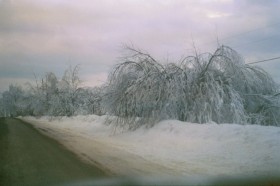in Maine is famously varied and changeable, and at times, severe. The coast, moderated by the ocean, often has local weather far different from that in the western mountains or the expanses of Aroostook County. Adding to the complexity, global warming may be affecting our climate, as may be indicated by an increasing number of record high temperatures, such as those in Portland.
According to the National Weather Service, “On the morning of January 16, 2009, as New England was under the grip of an arctic blast, an all-time low temperature of -50° Fahrenheit was recorded for Maine. It was recorded at 7:30 a.m. EST at a U.S. Geological Survey (USGS) stream gauge on the Big Black River near Depot Mountain in northwestern Aroostook County. The previous record, -48° Fahrenheit, was set in Van Buren, Maine almost 84 years earlier, on January 19, 1925.”
The maximum recorded temperature in Maine was 105°F (40.6°C) July 10, 1911 at North Bridgton.
In 1762, Maine and eastern Massachusetts suffered a drought from early April to early August, severely stunting crops, threatening famine, and causing forest fire to rage over wide areas.
On January 8, 1770 the “Great Freshet” of that year caused substantial flooding along the lower reaches of the Kennebec and Androscoggin rivers. Ice dams moved and crushed trees, buildings and anything else in their path. At Brunswick, sawmills were swept away in the vicinity of the Falls, along with houses, boats, and a large number of logs intended for the local mills.
On the same date, 218 years later, the state suffered another ice disaster: the Ice Storm of 1998. Power was lost to tens of thousands of residents, private and public institutions were closed for days. Even the State Government in Augusta closed its offices.
The “cold summer” of 1816 is legendary among Maine citizens, though we sometimes cannot recall the year. June 5th was a pleasant day with expectations of a normal summer. On the 6th, however, that all changed in New England.
According to Perley,
In Maine, the change came suddenly, with squalls from the northwest, and snow and hail for one and a half hours, the flakes being so large that when they struck the ground they spread out two inches and a half in diameter. The frost and cold chilled and killed the martins and other birds, and froze the ground, cutting down corn and potatoes, and compelling workmen to put on great coats and mittens in order to keep warm.
The ensuing effect on crops caused the price of potatoes to soar to seventy-five cents a bushel, up from forty cents earlier that spring.
On April 24, 1827, a gale and flooding wrecked vessels in Portland Harbor, sent a grist mill down the Kennebunk River, and destroyed a bridge in Biddeford, among other mischief.
The Blizzard of 1888, or the “Great White Hurricane” as it was called, paralyzed the East Coast from the Chesapeake Bay to Maine. Telegraph and telephone wires snapped, isolating New York, Boston, Philadelphia, and Washington for days. Two hundred ships were grounded, and at least one hundred seamen died. Fire stations were immobilized, and property loss from fire alone was estimated at $25 million. Overall, more than 400 deaths were reported.
The weather leading up to the storm was unseasonably pleasant, but on March 11th it changed radically. The tremendous snowfall totals were a result of not only the duration of the event, but the fact that it was also a very intense storm. Snowfalls were in the 40-50+ inches range in some areas of New York and Connecticut. Much of western New England received from 20 to 30+ inches. Maine was spared the brunt of the storm, but southern and parts of western Maine generally received slightly over 10 inches.
Additional resources
Perley, Sidney. Historic Storms of New England. Beverly, Massachusetts: Memoirs Unlimited. 2001. (Originally published in 1891).
Brunner, Borgna. “The Great White Hurricane: The Blizzard Of 1888: March 11–March 14, 1888.” Infoplease.com.
National Weather Service. “New All-Time Low Temperature Recorded in Maine,” http://www.erh.noaa.gov/car/News_Items/2009-02-10_item001.htm (accessed April 16, 2011)
Routhier, Ray. “The Storm That Looms in Memory.” Maine Sunday Telegram. November 6, 2006. pp G1, G7.
“The Maine Climate.” Newsletter of the Maine State Climate Office. March, 2001.
Tougias, Michael J. Ten Hours Until Dawn. St. Martin’s Press. 2005.



